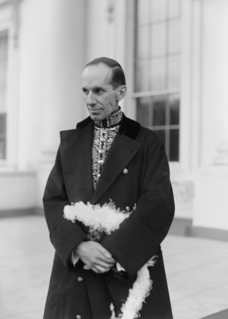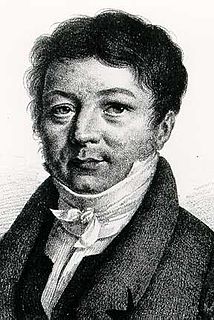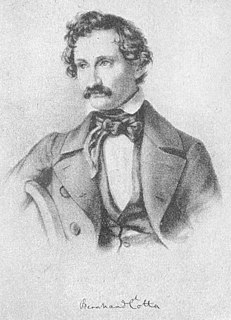A Quote by Bill Vaughan
There are certain events which to each man's life are as comets to the earth, seemingly strange and erratic portents; distinct from the ordinary lights which guide our course and mark our seasons, yet true to their own laws, potent in their own influences.
Related Quotes
If men lived like men indeed, their houses would be temples -- temples which we should hardly dare to injure, and in which it would make us holy to be permitted to live; and there must be a strange dissolution of natural affection, a strange unthankfulness for all that homes have given and parents taught, a strange consciousness that we have been unfaithful to our fathers honor, or that our own lives are not such as would make our dwellings sacred to our children, when each man would fain build to himself, and build for the little revolution of his own life only.
Does the open wound in another's breast soften the pain of the gaping wound in our own? Or does the blood which is welling from another man's side staunch that which is pouring from our own? Does the general anguish of our fellow creatures lessen our own private and particular anguish? No, no, each suffers on his own account, each struggles with his own grief, each sheds his own tears.
We are not born of the passions of war or of the fervours of revolution. And we grew quietly into the realization that, set as we are in a great wide land, with all our differences, there are certain traditions and ideals which we had in common, and which could best be preserved in a distinct society of our own.
It is so important to remember that, as we travel through life, there will be so many events which we can`t control. These are things that seemingly alter our lives forever or become barriers for living a life of fulfillment. It`s important to remember that the ultimate experience of life is not to be controlled by events. We all have difficult events in our lives - the loss of family members, economics, stress, litigation, government interference in our businesses, health challenges. Remember that it is not the events that shape our lives, but, rather, the meaning we attach to them.
With only one life to live we can't afford to live it only for itself. Somehow we must each for himself, find the way in which we can make our individual lives fit into the pattern of all the lives which surround it. We must establish our own relationships to the whole. And each must do it in his own way, using his own talents, relying on his own integrity and strength, climbing his own road to his own summit.
Our spirits have their own private way of understanding each other, of becoming intimate, while our external persons are still trapped in the commerce of ordinary words, in the slavery of social rules. Souls have their own needs and their own ambitions, which the body ignores when it sees that it's impossible to satisfy them or achieve them.
The jungle which is presided over by Kudu, the sun, is a very different jungle from that of Goro, the moon. The diurnal jungle has its own aspect--its own lights and shades, its own birds, its own blooms, its own beasts ... The lights and shades of the nocturnal jungle are as different as one might imagine the lights and shades of another world to differ from those of our world.
We live in strange times. We also live in strange places: each in a universe of our own. The people with whom we populate our universes are the shadows of whole other universes intersecting with our own. Being able to glance out into this bewildering complexity of infinite recursion and say things like, 'Oh, hi, Ed! Nice tan. How's Carol?' involves a great deal of filtering skill for which all conscious entities have eventually to develop a capacity in order to protect themselves from the contemplation of the chaos through which they seethe and tumble.
I know that certain minds would regard as audacious the idea of relating the laws which preside over the play of our organs to those laws which govern inanimate bodies; but, although novel, this truth is none the less incontestable. To hold that the phenomena of life are entirely distinct from the general phenomena of nature is to commit a grave error, it is to oppose the continued progress of science.
All things are sold: the very light of heaven is venal; earth's unsparing gifts of love, the smallest and most despicable things that lurk in the abysses of the deep, all objects of our life, even life itself, and the poor pittance which the laws allow of liberty, the fellowship of man, those duties which his heart of human love should urge him to perform instinctively, are bought and sold as in a public mart of not disguising selfishness, that sets on each its price, the stamp-mark of her reign.
In the course of the history of the earth innumerable events have occurred one after another, causing changes of states, all with certain lasting consequences. This is the basis of our developmental law, which, in a nutshell, claims that the diversity of phenomena is a necessary consequence of the accumulation of the results of all individual occurrences happening one after another... The current state of the earth, thus, constitutes the as yet most diverse final result, which of course represents not a real but only a momentary end-point.
Strange is our situation here on Earth. Each of us comes for a short visit, not knowing why, yet sometimes seeming to divine a purpose. From the standpoint of daily life, however, there is one thing we do know: that man is here for the sake of other men - above all for those upon whose smiles and well-being our own happiness depends.
In a world in which we are exposed to more information, more options, more philosophies, more perspectives than ever before, in which we must choose the values by which we will live (rather than unquestioningly follow some tradition for no better reason than that our own parents did), we need to be willing to stand on our own judgment and trust our own intelligence-to look at the world through our own eyes-to chart our course and think through how to achieve the future we want, to commit ourselves to continuous questioning and learning-to be, in a word, self-responsible.
I am aware that the conclusions arrived at in this work will be denounced by some as highly irreligious; but he who denounces them is bound to show why it is more irreligious to explain the origin of man as a distinct species by descent from some lower from, through the laws of variation and natural selection, than to explain the birth of the individual through the laws of ordinary reproduction. The birth both of the species and of the individual are equally parts of that grand sequence of events, which our minds refuse to accept as the result of blind chance.

































